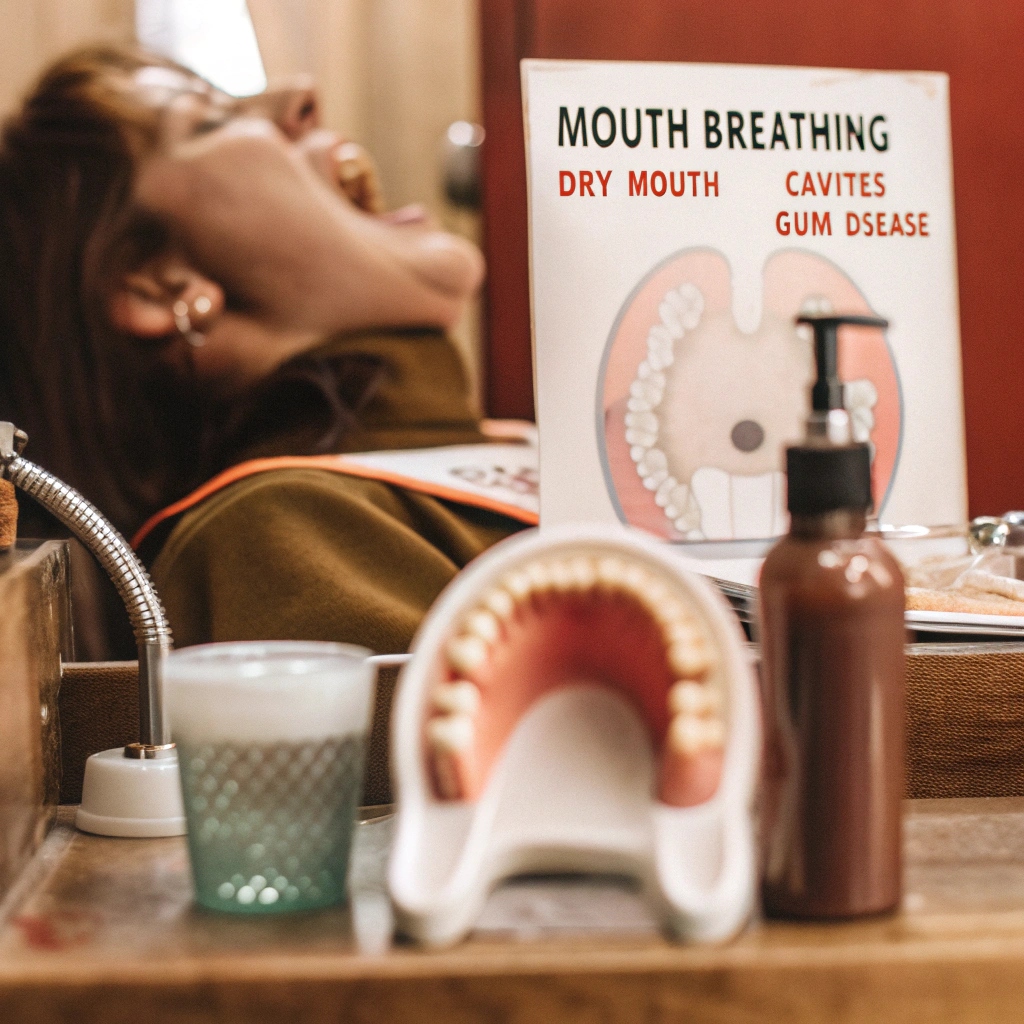
- Home
- About us
- Dental Services
- Pediatric Dentistry
- Patient Safety
- Contact us

Breathing is something we do without thinking, but did you know how you breathe can impact your oral health? While nasal breathing is the natural way for humans to take in oxygen, some people habitually breathe through their mouths, often without realizing the consequences.
Mouth breathing, whether due to nasal congestion, allergies, or habit, can lead to several dental and oral health issues. If left unchecked, it may contribute to cavities, gum disease, bad breath, and even changes in facial structure. In this blog, we’ll explore how mouth breathing affects oral health and what you can do to prevent its harmful effects.
1. Dry Mouth: A Gateway to Dental Problems
One of the biggest downsides of mouth breathing is a dry mouth. Normally, saliva plays a crucial role in keeping your mouth moist, washing away food particles, and neutralizing acids that cause tooth decay. However, when you breathe through your mouth, saliva evaporates more quickly, leading to dryness.
A dry mouth (xerostomia) creates the perfect environment for bacteria to thrive, increasing the risk of cavities, bad breath, and gum disease. Without enough saliva, your teeth and gums are left vulnerable to plaque buildup and acid attacks.
2. Increased Risk of Cavities
Saliva acts as a natural defense against tooth decay, helping to remineralize enamel and prevent bacterial overgrowth. Mouth breathing reduces saliva flow, leading to a more acidic environment in the mouth. This weakens tooth enamel, making teeth more susceptible to cavities.
If you or your child breathe through your mouth frequently, it’s essential to pay extra attention to oral hygiene and hydration to counteract the effects of reduced saliva.
3. Gum Inflammation and Periodontal Disease
Chronic mouth breathing can cause gums to become red, swollen, and irritated. Over time, this can progress to gingivitis (early gum disease) and even periodontitis (severe gum infection that can lead to tooth loss).
Mouth breathing also changes the balance of oral bacteria, leading to increased plaque buildup along the gumline. If left untreated, this can result in receding gums, bone loss, and long-term oral health complications.
4. Bad Breath (Halitosis)
Ever wake up with a dry mouth and bad breath? That’s because saliva helps wash away bacteria and food particles that cause odors. Mouth breathing exacerbates bad breath by reducing saliva production and allowing bacteria to accumulate.
If you struggle with persistent bad breath, consider whether mouth breathing might be a contributing factor. Addressing the root cause can help improve both your oral health and confidence.
5. Changes in Jaw and Facial Development (in Children)
For children, chronic mouth breathing can affect the development of their teeth, jaw, and face. Since nasal breathing helps shape the jaw properly, mouth breathing can lead to a narrower palate, misaligned teeth, and even changes in facial structure—a condition known as “long face syndrome.”
Common signs of this in children include:
A high-arched palate
Crooked or crowded teeth
An elongated face with a receded chin
Dark circles under the eyes (due to poor oxygenation)
Early intervention with a dentist or orthodontist can help correct these issues before they become permanent.
How to Prevent the Negative Effects of Mouth Breathing
If you or your child are habitual mouth breathers, here are some steps to help mitigate the impact:
✅ Identify the Cause – Nasal congestion, allergies, or anatomical issues (like a deviated septum) could be the reason behind mouth breathing. Consult an ENT specialist if necessary.
✅ Stay Hydrated – Drink plenty of water throughout the day to keep your mouth moist.
✅ Practice Nasal Breathing – If you catch yourself breathing through your mouth, make a conscious effort to switch to nasal breathing. Breathing exercises or mouth taping (under guidance) can help.
✅ Maintain Good Oral Hygiene – Brush twice a day, floss daily, and use a fluoride mouthwash to protect against cavities and gum disease.
✅ Visit Your Dentist Regularly – Regular dental checkups can help detect early signs of mouth-breathing-related issues and provide preventive care.
Final Thoughts
Mouth breathing may seem harmless, but its impact on oral health is significant. From dry mouth and cavities to gum disease and facial development issues, the consequences can be long-lasting. By understanding the risks and taking proactive steps to encourage nasal breathing, you can protect your smile and overall well-being.
If you suspect that mouth breathing is affecting your oral health, don’t hesitate to speak with your dentist. A personalized approach to treatment can help restore healthy breathing habits and keep your teeth and gums in top condition.
Got questions or concerns about mouth breathing and oral health? Feel free to drop them in the comments below!
